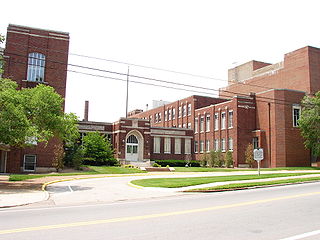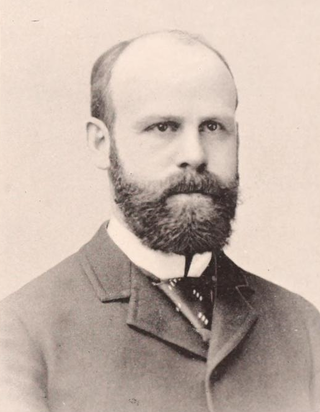Osteopathic medicine is a branch of the medical profession in the United States that promotes the practice of science-based medicine, often referred to in this context as allopathic medicine, with a set of philosophy and principles set by its earlier form, osteopathy. Osteopathic physicians (DOs) are graduates of American osteopathic medical colleges and are licensed to practice the full scope of medicine and surgery in all 50 U.S. states. The field is distinct from osteopathic practices offered in nations outside of the U.S.—in which practitioners are generally considered neither parts of core medical staff nor of medicine itself; rather, they are considered alternative medicine practitioners. The other major branch of medicine in the United States is referred to by practitioners of osteopathic medicine as allopathic medicine.

Meharry Medical College is a private historically black medical school affiliated with the United Methodist Church and located in Nashville, Tennessee. Founded in 1876 as the Medical Department of Central Tennessee College, it was the first medical school for African Americans in the South. While the majority of African Americans lived in the South, they were excluded from many public and private racially segregated institutions of higher education, particularly after the end of Reconstruction.

The American Medical Association (AMA) is an American professional association and lobbying group of physicians and medical students. Founded in 1847, it is headquartered in Chicago, Illinois. Membership was 271,660 in 2022.

Leonidas Harris Berry was an American and pioneer in gastroscopy and endoscopy. He served as the president of the National Medical Association from 1965 to 1966.
John Edward Hill is an American family physician in Tupelo, Mississippi.

Robert Provenzano is an American nephrologist. He is also an Associate Clinical Professor of Medicine at Wayne State University School of Medicine.

Timeline of events related to sexual orientation and medicine
The American Academy of Physical Medicine and Rehabilitation (AAPM&R) is the national medical specialty society in the United States for physicians who specialize in physical medicine and rehabilitation (PM&R). These physicians are called "physiatrists" or "rehabilitation physicians". Founded in 1938, AAPM&R also offers education, advocates for PM&R, and promotes PM&R research.
Lisa A. Cooper is an American internal medicine and public health physician who is the Bloomberg Distinguished Professor of Equity in Health and Healthcare at Johns Hopkins University, jointly appointed in the Johns Hopkins School of Medicine, Johns Hopkins School of Nursing and in the departments of Health, Behavior and Society, Health Policy and Management; Epidemiology; and International Health in the Johns Hopkins Bloomberg School of Public Health. She is the James F. Fries Professor of Medicine in the Division of General Internal Medicine, Director of the Johns Hopkins Center for Health Equity, and Director of the Johns Hopkins Urban Health Institute. Cooper is also a Gilman Scholar and a core faculty member in the Welch Center for Prevention, Epidemiology, and Clinical Research. She is internationally recognized for her research on the impact of race, ethnicity and gender on the patient-physician relationship and subsequent health disparities. She is a member of the President’s Council of Advisors on Science and Technology (PCAST). In 2007, she received a MacArthur Fellowship.
Matthew Walker Sr. was an American physician and surgeon. He was one of the first African Americans to become a Fellow of the American College of Surgeons. He was one of the most prominent Black doctors in the 20th century in the United States.

Choosing Wisely is a United States–based health educational campaign, led by the ABIM Foundation, about unnecessary health care.

Roscoe Conkling Giles was an American medical doctor and surgeon. He was the first African American to earn a degree from Cornell University Medical College. Giles worked as a surgeon at Provident Hospital in Chicago, and served as the hospital's Chairman of the Division of General Surgery. In 1915, he became the first African American to lead a city health department. He was elected President of the National Medical Association in 1935.

Barry Keith Herman is an American board certified adult and child and adolescent psychiatrist, psychiatric administrator, and physician executive. He currently is Chief Medical Officer of Atentiv Health, a digital health specialty provider, since March, 2020. Immediately prior, he was Senior Vice President and Chief Medical Officer of Tris Pharmaceuticals, Inc. in Monmouth Junction, NJ. He left this position at Tris in January 2020. Herman's interests include psychiatric administration and management, healthcare policy, and psychopharmacological research. He has spoken and written frequently on the topic of physician leadership and management. He is the author of over 100 scientific abstracts and manuscripts, and is frequently quoted in the media. His psychiatric research has been widely cited. Herman is the Past President of the American Association of Psychiatric Administrators, and currently serves on its Executive Council. He is the recipient of the 2017 American Psychiatric Association Administrative Psychiatry Award.

Lucius Duncan Bulkley was an American dermatologist and alternative cancer treatment advocate.
Richard Allen Williams is an American physician who is founder of the Association of Black Cardiologists. He previously served as the President of the National Medical Association.

Russell Morse Wilder Sr. was an American physician, diabetologist, epileptologist, and medical researcher, known as one of the originators of the ketogenic diet as a therapy for both epilepsy and diabetes. He coined the term "ketogenic diet." He was also among the first American physicians to use insulin for patients with diabetes.

Fatima Cody Stanford is an American obesity medicine physician, internist, and pediatrician and an associate professor of medicine and pediatrics at Harvard Medical School. She is one of the most highly cited scientists in the field of obesity. She is recognized for shifting the global perception of obesity as a chronic disease.
Edwin Herman Lennette was an American physician, virologist, and pioneer of diagnostic virology.
Lonnie Robert Bristow is an American physician and former president of the American Medical Association (AMA). In his early career he established a private practice in San Pablo, California, as an internist with a special interest in occupational medicine, and wrote on sickle cell disease and misinformation on sickle cell trait. As the first African American president of the AMA in its 148 year history, he headed the introduction of questions on medical ethics into medical board exams and encouraged education about HIV/AIDS.
Carolyn Barley Britton is an African-American medical doctor known for her national health care advocacy and work in neurological complications of HIV and infectious diseases. She is a full professor at Columbia University College of Physicians and Surgeons. She was the 9th female president and the 1st neurologist president of the National Medical Association.












